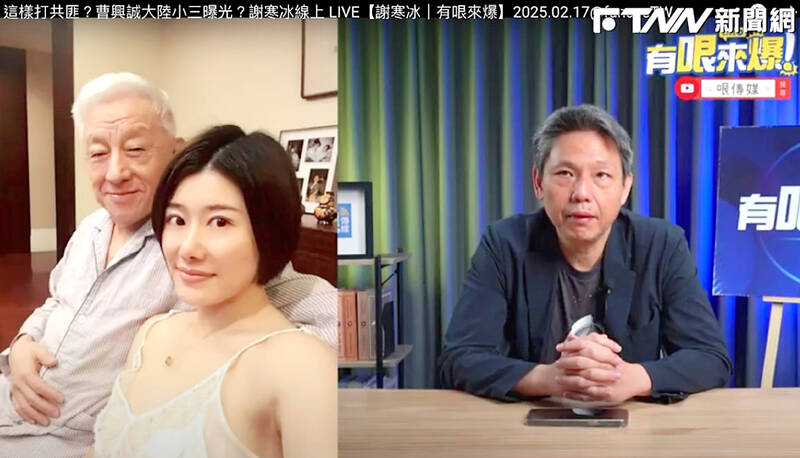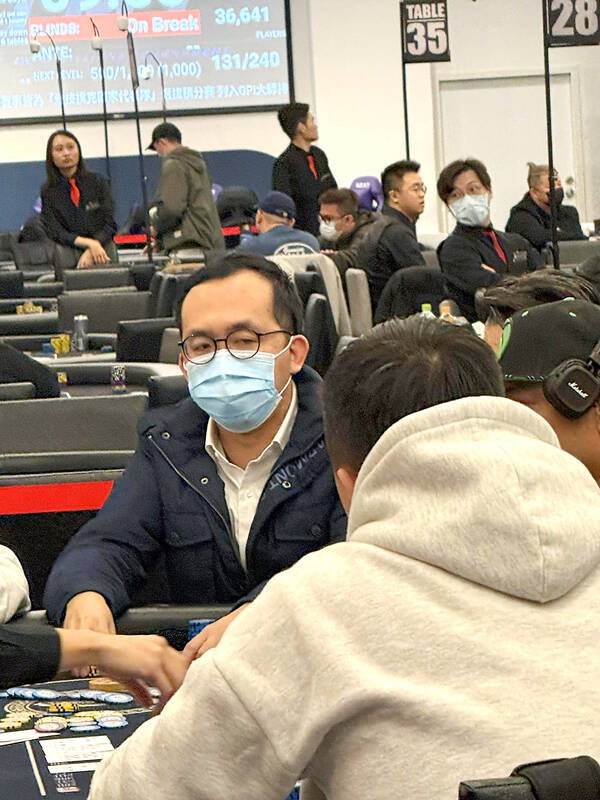The Chinese Communist Party (CCP) frequently produces doctored images using deepfake technology or artificial intelligence (AI) as a smear tactic or to manipulate politics in Taiwan, Mainland Affairs Council Chairman Chiu Chui-cheng (邱垂正) said yesterday.
Chiu was asked about images of United Microelectronics Corp founder Robert Tsao (曹興誠) circulating online that appeared to show he had an intimate relationship with an Asian woman.
Using the images, political commentator Hsieh Han-ping (謝寒冰) accused Tsao of having an affair with a young Chinese woman in 2015.

Photo: screen grab from a livestream of Hsieh Han-ping’s show
However, another commentator, Chang Yi-shan (張益贍), said that analysis by ChatGPT showed that the photos were likely produced using generative AI.
Tsao, who is leading a campaign to recall Chinese Nationalist Party (KMT) lawmakers, including Legislator Hsu Chiao-hsin (徐巧芯), in a statement yesterday said that he has filed a civil lawsuit against Hsieh and is seeking NT$100 million (US$3.05 million) in restitution for spreading fake photos.
Tsao also filed criminal lawsuits against Hsieh for forgery and offenses against reputation and credit.

Photo from Wen Lan-tung’s Facebook page
Chiu told reporters after speaking on a radio program yesterday morning that the CCP has been seeking new and innovative ways to infiltrate and divide Taiwan, adding that the MAC would step up efforts to counter Chinese infiltration and its “united front” work.
“We know that deepfakes and AI can make fake photos and messages that appear to be true, which the CCP frequently uses to disrupt the operation of constitutional democracy and spread anxiety in Taiwan,” Chiu said.
“The government is working to enhance our people’s literacy of online information, particularly those from China,” he added.
Democratic Progressive Party caucus chief executive Rosalia Wu (吳思瑤) said that she supported Tsao’s right to defend his character by filing lawsuits against people who distributed the photos.
Tsao does not hold any public office and personal attacks against him for leading the recall campaign might all come from “one central kitchen,” Wu said, adding that such acts should not be tolerated in a country with rule of law.
KMT think tank deputy director Ling Tao (凌濤) said that the government should investigate the photos, as leaking sensitive intelligence threatens national security.
Meanwhile, Hsu’s husband, Liu Yen-li (劉彥澧), who is head of the Taichung Research, Development and Evaluation Commission, said that he took a day off work to play in a Texas hold’em tournament after a photo of him playing cards was posted on Facebook by political commentator Wen Lan-tung (溫朗東).
The post, which garnered more than 800 comments in less than 24 hours, said that “many Texas hold’em venues are run by gangs and scammers,” and included a picture of the city official seated at a poker table.
Liu told reporters that he asked for leave according to the city government’s regulations to attend the “legal, formal competition championship” last month.
“Because of my role at the Taichung City Government, playing poker has become a political discussion and caused people to question the legality of the game. I will consider my ways and try to improve,” Liu said in a statement.
The photo emerged after Hsu said that Tsao should explain his actions to the public.
Additional reporting by CNA

The Coast Guard Administration (CGA) yesterday said it had deployed patrol vessels to expel a China Coast Guard ship and a Chinese fishing boat near Pratas Island (Dongsha Island, 東沙群島) in the South China Sea. The China Coast Guard vessel was 28 nautical miles (52km) northeast of Pratas at 6:15am on Thursday, approaching the island’s restricted waters, which extend 24 nautical miles from its shoreline, the CGA’s Dongsha-Nansha Branch said in a statement. The Tainan, a 2,000-tonne cutter, was deployed by the CGA to shadow the Chinese ship, which left the area at 2:39pm on Friday, the statement said. At 6:31pm on Friday,

The Chinese People’s Liberation Army Navy’s (PLAN) third aircraft carrier, the Fujian, would pose a steep challenge to Taiwan’s ability to defend itself against a full-scale invasion, a defense expert said yesterday. Institute of National Defense and Security Research analyst Chieh Chung (揭仲) made the comment hours after the PLAN confirmed the carrier recently passed through the Taiwan Strait to conduct “scientific research tests and training missions” in the South China Sea. China has two carriers in operation — the Liaoning and the Shandong — with the Fujian undergoing sea trials. Although the PLAN needs time to train the Fujian’s air wing and

The American Institute in Taiwan (AIT) put Taiwan in danger, Ma Ying-jeou Foundation director Hsiao Hsu-tsen (蕭旭岑) said yesterday, hours after the de facto US embassy said that Beijing had misinterpreted World War II-era documents to isolate Taiwan. The AIT’s comments harmed the Republic of China’s (ROC) national interests and contradicted a part of the “six assurances” stipulating that the US would not change its official position on Taiwan’s sovereignty, Hsiao said. The “six assurances,” which were given by then-US president Ronald Reagan to Taiwan in 1982, say that Washington would not set a date for ending arm sales to Taiwan, consult

A Taiwanese academic yesterday said that Chinese Ambassador to Denmark Wang Xuefeng (王雪峰) disrespected Denmark and Japan when he earlier this year allegedly asked Japan’s embassy to make Taiwan’s representatives leave an event in Copenhagen. The Danish-language Berlingske on Sunday reported the incident in an article with the headline “The emperor’s birthday ended in drama in Copenhagen: More conflict may be on the way between Denmark and China.” It said that on Feb. 26, the Japanese embassy in Denmark held an event for Japanese Emperor Naruhito’s birthday, with about 200 guests in attendance, including representatives from Taiwan. After addressing the Japanese hosts, Wang